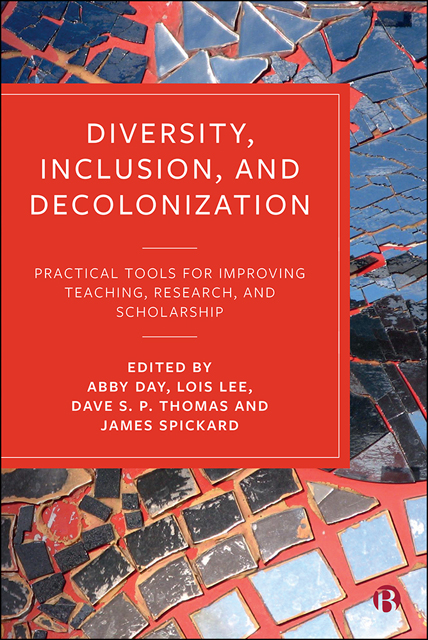 Diversity, Inclusion, and Decolonization
Diversity, Inclusion, and Decolonization Book contents
- Frontmatter
- Contents
- List of Figures and Tables
- Notes on Contributors
- Acknowledgements
- Typographical Note
- Introduction: Why Diversity, Inclusion, and Decolonization Matter
- Part I Changing Universities
- Part II Diversifying Curricula
- Part III Diversifying Research and Scholarship
- Part IV Overcoming Intellectual Colonialism
- Epilogue: What We Have Learned
- Index
2 - Demystifying the ‘Decolonizing’ and ‘Diversity’ Slippage: Reflections from Sociology
Published online by Cambridge University Press: 13 October 2022
- Frontmatter
- Contents
- List of Figures and Tables
- Notes on Contributors
- Acknowledgements
- Typographical Note
- Introduction: Why Diversity, Inclusion, and Decolonization Matter
- Part I Changing Universities
- Part II Diversifying Curricula
- Part III Diversifying Research and Scholarship
- Part IV Overcoming Intellectual Colonialism
- Epilogue: What We Have Learned
- Index
Summary
Introduction: critiquing the decolonizing-diversity slippage
Colonialism and education have always been linked. Indeed, one significant way that European empires naturalized the ‘superiority’ of Western knowledge was by setting up educational institutions, including universities, in the colonies. These would teach in imperial languages and focus on a Western canon, which would buttress the view that ‘knowledge’ comes from the West while ‘the rest’ merely has tradition, superstition, and premodern beliefs. Even after the collapse of many colonial administrations in the 20th century, universities in newly ‘independent’ nations continued to function as they had done before. They continued to reproduce ideas of Western superiority and non-Western backwardness (Uys, 2010). It is fair to say, therefore, that calls to ‘decolonize’ the university are certainly not recent and, indeed, that struggles against universities and structures of knowledge more generally have been part of anti-colonial insurgency for several centuries.
The decade since 2010 has seen increasing calls from British university student movements to ‘decolonize the university’ and ‘decolonize the curriculum’. In a typical neoliberal response, British universities quickly co-opted the terminology of ‘decolonizing’ as a marketing tool to signal themes such as ‘equality’, ‘diversity’, and ‘openness’ (Ahmed, 2015). This meant that, for instance, City University of London’s Decolonizing the Curriculum campaign was itself endorsed by a member of the royal family.
In this chapter, we wish to address this conceptual ‘fuzziness’ surrounding debates over decolonizing curricula, paying special attention to how the project of decolonizing is quite different from the discourse of ‘diversity’.
Part of the reason why decolonizing the curriculum is so different to merely ‘diversifying’ is because decolonizing knowledge involves a radical critique of epistemology. If one were to construct a reading list for social theory – for instance – where more than 50 per cent of the taught authors were people of colour, this would not necessarily mean that one had a ‘decolonized curriculum’.
Information
- Type
- Chapter
- Information
- Diversity, Inclusion, and DecolonizationPractical Tools for Improving Teaching, Research, and Scholarship, pp. 31 - 47Publisher: Bristol University PressPrint publication year: 2022